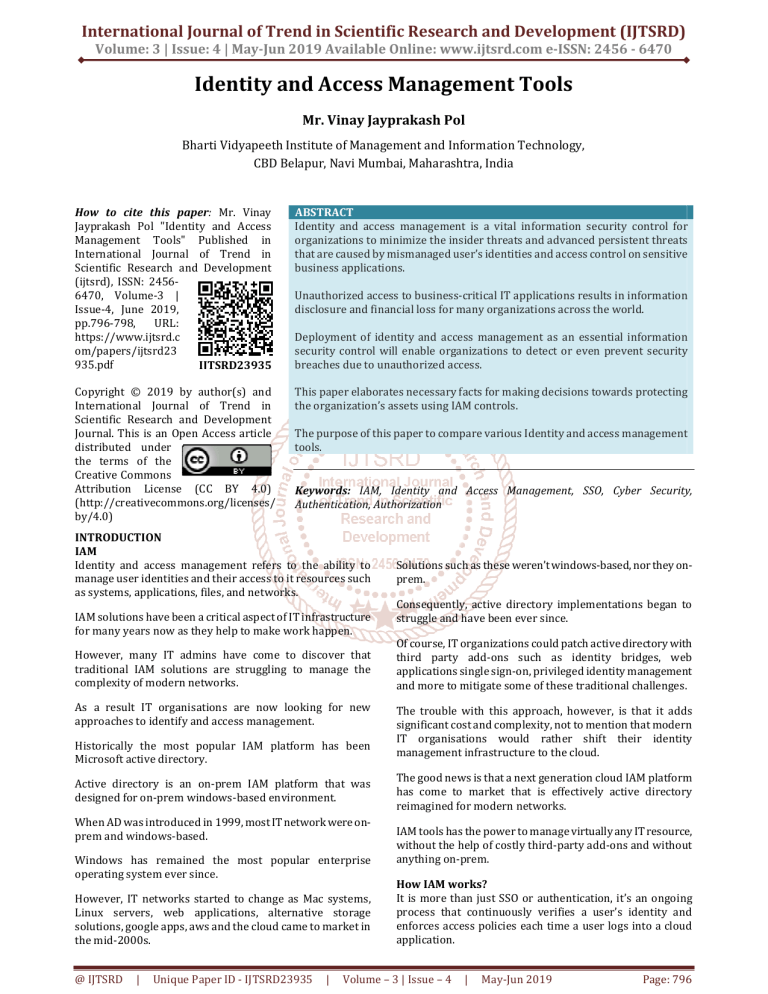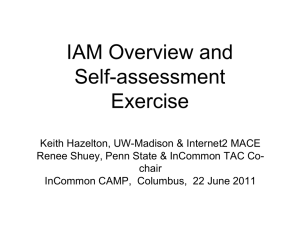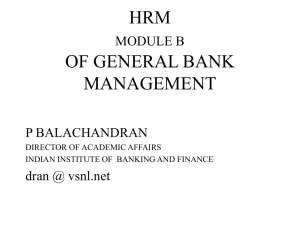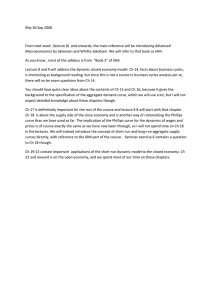
International Journal of Trend in Scientific Research and Development (IJTSRD) Volume: 3 | Issue: 4 | May-Jun 2019 Available Online: www.ijtsrd.com e-ISSN: 2456 - 6470 Identity and Access Management Tools Mr. Vinay Jayprakash Pol Bharti Vidyapeeth Institute of Management and Information Technology, CBD Belapur, Navi Mumbai, Maharashtra, India How to cite this paper: Mr. Vinay Jayprakash Pol "Identity and Access Management Tools" Published in International Journal of Trend in Scientific Research and Development (ijtsrd), ISSN: 24566470, Volume-3 | Issue-4, June 2019, pp.796-798, URL: https://www.ijtsrd.c om/papers/ijtsrd23 935.pdf IJTSRD23935 ABSTRACT Identity and access management is a vital information security control for organizations to minimize the insider threats and advanced persistent threats that are caused by mismanaged user’s identities and access control on sensitive business applications. Copyright © 2019 by author(s) and International Journal of Trend in Scientific Research and Development Journal. This is an Open Access article distributed under the terms of the Creative Commons Attribution License (CC BY 4.0) (http://creativecommons.org/licenses/ by/4.0) This paper elaborates necessary facts for making decisions towards protecting the organization’s assets using IAM controls. Unauthorized access to business-critical IT applications results in information disclosure and financial loss for many organizations across the world. Deployment of identity and access management as an essential information security control will enable organizations to detect or even prevent security breaches due to unauthorized access. The purpose of this paper to compare various Identity and access management tools. Keywords: IAM, Identity and Access Management, SSO, Cyber Security, Authentication, Authorization INTRODUCTION IAM Identity and access management refers to the ability to manage user identities and their access to it resources such as systems, applications, files, and networks. IAM solutions have been a critical aspect of IT infrastructure for many years now as they help to make work happen. However, many IT admins have come to discover that traditional IAM solutions are struggling to manage the complexity of modern networks. As a result IT organisations are now looking for new approaches to identify and access management. Historically the most popular IAM platform has been Microsoft active directory. Active directory is an on-prem IAM platform that was designed for on-prem windows-based environment. When AD was introduced in 1999, most IT network were onprem and windows-based. Windows has remained the most popular enterprise operating system ever since. However, IT networks started to change as Mac systems, Linux servers, web applications, alternative storage solutions, google apps, aws and the cloud came to market in the mid-2000s. @ IJTSRD | Unique Paper ID - IJTSRD23935 | Solutions such as these weren’t windows-based, nor they onprem. Consequently, active directory implementations began to struggle and have been ever since. Of course, IT organizations could patch active directory with third party add-ons such as identity bridges, web applications single sign-on, privileged identity management and more to mitigate some of these traditional challenges. The trouble with this approach, however, is that it adds significant cost and complexity, not to mention that modern IT organisations would rather shift their identity management infrastructure to the cloud. The good news is that a next generation cloud IAM platform has come to market that is effectively active directory reimagined for modern networks. IAM tools has the power to manage virtually any IT resource, without the help of costly third-party add-ons and without anything on-prem. How IAM works? It is more than just SSO or authentication, it’s an ongoing process that continuously verifies a user’s identity and enforces access policies each time a user logs into a cloud application. Volume – 3 | Issue – 4 | May-Jun 2019 Page: 796 International Journal of Trend in Scientific Research and Development (IJTSRD) @ www.ijtsrd.com eISSN: 2456-6470 So in the old ways there was only one remote access point the VPN. Authenticate to the VPN and get access to all of the enterprise apps you need in one shot. But nowadays an employee may need access to several different cloud apps throughout the workday. This is a hassle for both users and IT. Users have to remember many credentials which IT has to manage. The solution to this program is SSO. By having one credential for all cloud apps, user can easily log in once to several apps while IT saves time on password reset. Well depends how you look at it. Authorization checks the resource access request from URL in web-based application and compares it with authorization policies that are stored in IAM. 3. User Management User management consists of user management, password management, user /group provisioning and role /user management. It provides various administrative functions such as identity creation, propagation and maintains user identity and provides. One of its features is user life cycle management that allows enterprise to manage the lifespan of a user account, from the initial stage of provisioning to the final stage of deprovisioning. Self-service is another feature in user management, so that user can update their data. While convenient, SSO can also be risky. Another function of self service is self-password reset, so that they can reset password of their own. By allowing users to login to a bunch of apps with one credential, it leaves all cloud apps vulnerable if that credential were to be compromised. 4. Central User Repository This is where all the information about user is stored. This is exactly where Cloud Access Management comes in. By combining Identity Verification, SSO and Access Policies Enforcement an Access Management Solution can continuously verify a user's identity and enforce access policies for each application. So user gets an SSO experience while IT protects access to cloud apps. IAM framework Central user repository also provides identity data to other resources and verifies the credentials submitted by various users. List of Tools 1. SailPoint 2. IBM 3. Oracle 1. SailPoint Sailpoint is an eco-friendly model. It’s a powerful IAM tool against data breaches and data leakage. Its capacity to work with large amounts of data provides a competitive advantage in a world where online data is getting bigger and bigger, as well as it improves security for global teams. 2. IBM IBM Security Identity Governance and Administration is a suite that integrates their Security Identity Manager and their Security Identity Governance system (based on the recently acquired Cross Ideas platform). 1. Authentication Authentication is a function using which a user enter their credentials to obtain access to application. Once authentication of user is done, session is created for communication between user and application. After maintaining the user's session, it provides Single-SignOn service so that user does not require logging in into the system again. 2. Authorization Authorization is a function that decides that a user is permitted to get access to a particular resource. @ IJTSRD | Unique Paper ID - IJTSRD23935 | This IAM solution includes user access management, identity management and governance, and regulatory compliance evaluation. 3. Oracle The Oracle Identity Governance Suite is particularly convenient for large organizations. It is a complete solution that uses analytics to address privileged account management, user administration and identity intelligence. Volume – 3 | Issue – 4 | May-Jun 2019 Page: 797 International Journal of Trend in Scientific Research and Development (IJTSRD) @ www.ijtsrd.com eISSN: 2456-6470 COMPARISION OF VARIOUS TOOLS Features IBM SailPoint Access Management Yes Yes Single Sign-On Yes Yes Multi Factor Authentication Yes Yes User Activity Compliance Yes Yes Identity Governance Yes Yes Managed Security Services Yes Yes User Provisioning Yes Yes Automate Risk Mitigation Yes Compliance Manager Yes Yes Lifecycle Manager Yes Yes Identity Intelligence Yes Governance Platform Yes Yes Integration Modules Yes Yes Secure Token Service Yes Yes Oracle Yes Yes Yes Yes Yes Yes Yes Yes Yes Conclusion Businesses that need to design and implement complicated IAM strategies and need strong support along the way would be the best suited for this tool. @ IJTSRD | Unique Paper ID - IJTSRD23935 | Since IBM provides strategic, as well as deployment solutions, if an enterprise has an IAM problem and does not know where to start to solve it, IBMs IAM tool can help. IBM is an industry leader with both tradition and innovation capabilities, Therefore, many enterprise businesses choose it as the best all-in-one identity access management (IAM) tool to reduce risks of insider threat and identity fraud, manage administrative compliance and automatically improve collaboration between users. Reference [1] https://www.sciencedirect.com/science/article/pii/S22 15098617316750#s0225 [2] https://searchcloudcomputing.techtarget.com/feature/ How-to-get-started-with-IAM-services-in-the-cloud [3] https://www.getkisi.com/blog/identity-accessmanagement-tools Volume – 3 | Issue – 4 | May-Jun 2019 Page: 798






